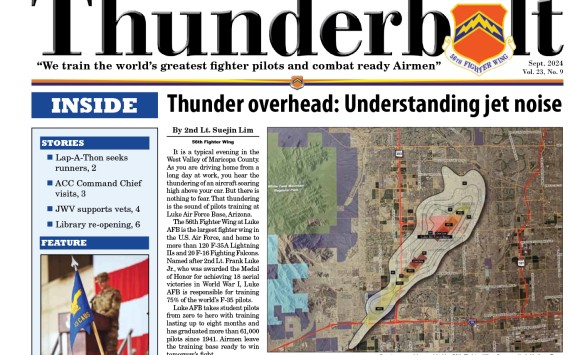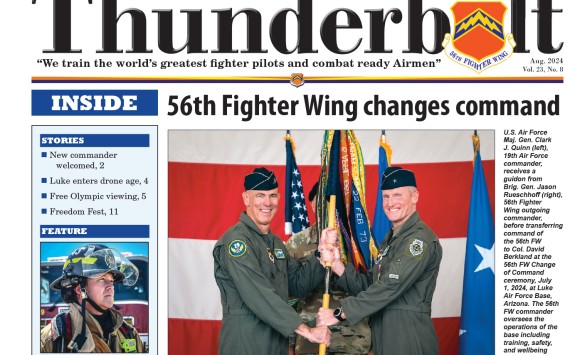Editor’s Note: The “People First” section is compiled from information from the Air Force Personnel Center, TRICARE, 56th Force Support Squadron, Airman and Family Readiness Flight, Veterans Affairs, the civilian personnel office and armed forces news services. For the complete story, go to the web address listed at the end of the story.
First all-female honor flight gets hero’s welcome in DC
Female veterans, trailblazers who served in the military decades ago, recently received a hero’s welcome after arriving in the nation’s capital on the first all-female honor flight.
“Best day of my life” is how retired Army Sgt. Maj. Sue Williams described the visit, which included stops at Arlington National Cemetery and the World War II Memorial.
Williams, who retired in 1995 after nearly three decades of service, helped lay a wreath at the Tomb of the Unknowns.
The women, from wars including World War II, the Korean War and the Vietnam War, traveled with Honor Flight Tri-State, which covers southern Ohio, northern Kentucky and southeast Indiana.
They arrived to a hero’s welcome for the daylong trip, receiving applause, handshakes and greetings of “thank you for your service” at all the sites they visited.
“It’s a dream come true,” said Sara Abrams.
Autism Care Demonstration updates to reduce cost burden
In an effort to continually improve benefits, the Comprehensive Autism Care Demonstration was recently updated to reduce the potential financial burden of applied behavior analysis services for nonactive-duty families.
As of Oct. 1, all ACD cost-shares will match TRICARE Prime and Standard cost-shares for all ABA services provided by authorized ABA supervisors, assistant behavior analysts and behavior technicians. This change will allow cost-shares to contribute to the annual catastrophic cap for families and eliminates the 10 percent cost-share for assistant behavior analyst and behavior technician services, also known as “tiered” services, significantly reducing the potential financial burden of ABA services for non-active-duty families.
Revisions were also made to enhance the quality and safety of ABA services. All ABA providers will become trained in basic life support by Dec. 31, 2015. Many beneficiaries diagnosed with autism spectrum disorder typically have other medical conditions, and in the rare event that basic life support would be needed to save a life, all ABA providers will be trained. All behavior technicians are also now required to obtain certification from an accredited organization.
Air University issues 2015 strategic plan
Air University provided a roadmap for its ongoing transformation efforts with the release of the Air University Strategic Plan.
This document is Air University’s way of aligning actions and resources with the broader Air Force vision outlined in the other publications “America’s Air Force: A Call to the Future” and “USAF Strategic Master Plan.”
“Now is the time for Air University to adapt to meet the demands of the Information Age,” said Lt. Gen. Steven Kwast, the Air University commander and president. “We must continue to out-think and out-innovate our adversaries. Air University has always been a vital center of critical thinking and a source of new ideas for the Air Force. Today is no exception.”
Strategic agility requires a decentralized approach, and the strategic plan outlines six principles that will guide decisions moving forward:
• Embrace Air University’s identity as a military organization with an academic mission
• Invest in people constantly
• Align authority, responsibility, resources and accountability to support decentralized execution
Negotiation core ability in leadership training
The secretary of the Air Force announced a commitment to formally solidify the Air Force Negotiation Center as the focal point for negotiation research, teaching and outreach efforts while speaking at the Women in Negotiation Summit in New York City Oct. 1.
“Building negotiating skills into leadership training throughout our Airmen’s career ensures that all Air Force members have the skills needed to succeed in our complex and diverse environment,” said Secretary of the Air Force Deborah Lee James.
As a core competency, adaptive negotiation skills will foster collaborative relationships to enhance success in the joint environment, build partnership capability, increase cross-organizational communication, and achieve better results for both the Air Force and taxpayer.
“Adding new tools to help us ensure our Airmen have the right negotiation skills to make better decisions will ultimately help keep the Air Force the strongest on the planet,” James said.











